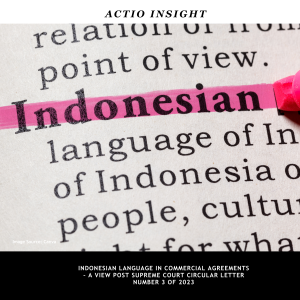INDONESIAN LANGUAGE IN COMMERCIAL AGREEMENTS – A VIEW POST SUPREME COURT CIRCULAR LETTER NUMBER 3 OF 2023
by Setyawati Fitrianggraeni, Eva Fatimah Fauziah, Sri Purnama*
Research Group Arbitration and Alternative Dispute Resolutions
Working Committee Disputes and Transnational Litigation
Legal Lab Team, Anggraeni and Partners
INTRODUCTION
The Indonesian Supreme Court has recently issued Circular Letter Number 3 of 2023 on the Enforcement of 2023 Supreme Court Chamber Plenary Meeting Result Formulations as Guidelines for the Implementation of the Duties of the Court (SCCL 3/2023). This circular letter serves as a guideline for the judges in interpreting some issues encountered in legal proceedings. SCCL 3/2023 contains 29 legal formulations, with 24 being entirely new legal norms. One of the most significant provisions concerns language in cross-border agreements.
This formulation addresses the issue of contracts made between Indonesian private entities or individuals and foreign parties in a foreign language without an accompanying Indonesian translation. It clarifies that the absence of an Indonesian translation does not automatically render such contracts void, except where bad faith due to this absence is demonstrably evident. While the validity of a contract has been clearly defined in Article 1320 of the Indonesian Civil Code requirements, another variable added up to this: the mandatory use of Indonesian language in commercial agreements, as outlined in Law Number 24 of 2009 concerning the National Flag, Language and Emblem, as well as the National Anthem (Law 24/2009) and Presidential Regulation Number 63 of 2019 concerning the Use of Indonesian Language (PR 63/2019).
Hence, this SCCL is a sight for sore eyes – at least for legal practitioners who often juggled with this multi-interpreted requirement. So, what was the status quo and how will this new formulation level up the playing field?
VALIDITY OF A CROSS-BORDER BUSINESS AGREEMENTS UNDER INDONESIAN LAW
In assessing the validity of cross-border business agreements under Indonesian law, the Indonesian Civil Code (ICC) remains the principal guide. Article 1320 ICC stipulates four core conditions for an agreement’s validity: mutual consent, legal capacity of parties, a specific and defined object, and a lawful cause. These criteria encompass subjective elements related to the agreement’s parties and objective aspects of the contract’s content.[1]
The landscape of contract law in Indonesia is further nuanced by the mandatory use of Bahasa Indonesia in business agreements. As delineated in Article 31 of Law 24/2009 and Article 26 PR 63/2019, this requirement applies to contracts involving state bodies, government institutions, private Indonesian entities, or citizens. In its implementation, it has introduced new challenges, especially in managing bilingual contracts in international agreements, where interpretational discrepancies often arise.
The prevalence of bilingual contracts in cross-border transactions necessitates careful drafting to avoid potential legal disputes. Whilst these contracts typically prioritise the agreed-upon language for interpretation, the lack of explicit impact for non-compliance with the language requirement in Indonesian law has been a point of contention. This was highlighted in the Nine AM v. PT Bangun Karya Pratama Lestari case, where the Supreme Court of Indonesia invalidated a loan agreement due to non-compliance with the language requirement.[2] The invalidation solely adheres to the statutory mandate regarding the requirements for a valid agreement as stipulated in Article 1320 of the Indonesian Civil Code, which among others necessitates the presence of a lawful cause. Article 31 of Law Number 24/2009 and Article 26 of PR 63/2019 signify that language requirement in agreements constitutes an action legitimised by statutory provisions. It can be presumed that by associating the requirement of a lawful cause with the provisions of language requirements in agreements, the judges of the Supreme Court categorised language requirements in agreements as a lawful cause in determining the validity of an agreement.
Under the Indonesian contract law, the concept of ‘lawful cause’ primarily pertains to the transaction’s substance rather than its formality. Therefore, the existence of an Indonesian version of an agreement is considered a formality, as seen in market practices where agreements are often drafted in both Indonesian and English, with either language, especially English, designated as the governing language. This practice is particularly relevant for foreign direct investment companies (PT PMA), which involve foreign participation despite being categorised as Indonesian entities under the Regulation. Therefore, accommodating agreements in English, especially in complex transactions or those involving foreign third parties, is beneficial for promoting foreign investment in Indonesia.
In conclusion, the mandatory use of Bahasa Indonesia in business agreements presents a unique challenge in cross-border transactions. Whilst the legislative intent is to uphold the national language, legal professionals must precisely navigate these requirements to ensure the clarity, validity, and enforceability of such agreements under Indonesian law.
THE CIRCULAR LETTER SERVES AS A NEW HOPE IN HAVING STANDARDIZED APPROACH ON LANGUAGE REQUIREMENT
The SCCL functions as a guiding framework rather than a binding regulation, maintaining the principle of judicial independence.[3] This means that whilst the SCCL provides direction, judges retain the discretion to interpret and apply its principles based on the unique circumstances of each case. This approach facilitates a more standardised application of law, accommodating the diverse legal challenges encountered in the Indonesian legal system.[4]
It addressed the concern that the absence of Indonesian language version of a contract does not automatically lead to its annulment. This departure from previous interpretations underscores the pragmatic approach towards the practicalities of cross-border agreements. It clarifies that bad faith must be demonstrably evident in the absence of an Indonesian translation for a contract to be potentially annulled. This provision introduces a more uniform understanding that the mere absence of the Indonesian version is not grounds for invalidating an agreement unless accompanied by elements of bad faith.
Regarding the issue of bad faith, it is pertinent to explore this concept further to provide context for SCCL 3/2023’s stance. The circular’s emphasis on bad faith as an exception to the general rule of contract validity necessitates an understanding of what constitutes bad faith within contractual relationships. SCCL 3/2023 does not provide an explicit definition. Instead, it necessitates understanding bad faith through the broader lens of civil law principles, particularly the principle of good faith in contractual relationships.[5] Good faith serves as a fundamental principle in contracts. The concept of good faith generally refers to an honest intention to act without taking an unfair advantage over another party. Beside in contracts, good faith is also a fundamental principle in many areas of law, business, and personal conduct, signifying a sincere belief or motive without any malice or the desire to defraud others.[6]
The SCCL’s approach to bad faith reflects two key issues. Firstly, the lack of a universally accepted definition of good faith challenges its consistent application across contractual implementations. This is evident when considering Article 1338 ICC, which lacks clarity in defining the legal parameters of good faith.[7] Secondly, the diverse legal tests employed by judges to determine the presence of good faith underscore the variability and subjectivity in judicial decision-making. Judges exercising their independence may interpret good faith differently, leading to diverse legal findings and impacting legal certainty.[8]
SCCL 3/2023 represents a progressive step in addressing legal ambiguities, particularly in cross-border business agreements. Whilst offering guidance, it preserves judicial independence, allowing judges to interpret its principles contextually. However, the flexible nature of good faith and its interpretation continues to be a subject of legal discourse, underscoring the ongoing need for clarity and consistency in the Indonesian legal system.
FORWARD LOOK AND IMPLICATIONS
As per the above discussion, the development departs from the previous reliance on the general validity criteria under Article 1320 of the Indonesian Civil Code, integrating the compulsory use of the Indonesian language as per Law 24/2009 and PR 63/2019. This evolution offers a clearer legal framework for cross-border agreements, emphasising the necessity of good faith and standardising language used to promote legal clarity, legal certainty over jurisdiction for dispute resolution, and certainty over any decisions regarding the use of language in agreements.
For legal practitioners, SCCL 3/2023 provides much-needed clarity in a previously ambiguous area.. Implementing this new norm is expected to create a more transparent and regulated environment for cross-border transactions, potentially enhancing trust and confidence.
However, the practical application of these norms presents potential challenges, particularly concerning their impact on international business relations and the need for effective enforcement. The imposition of a requirement mandating the use of Indonesian language in formulating international business agreements, ostensibly as a precaution against potential ill-intent from the other party, inherently fosters negative presumptions towards the contracting partner from the outset. This condition incites mutual distrust, contravening the principle of mutual trust as a vital element in the formation of agreements. The implications of SCCL 3/2023 are far-reaching, affecting not just language requirements but the broader spectrum of legal practice in Indonesia. As the legal community and businesses adjust to these changes, the full impact of this legislative shift will become increasingly apparent.
CONCLUSION
The SCCL 3/2023 represents a pivotal shift in Indonesia’s legal framework, particularly addressing the nuances of cross-border business agreements. Integrating 29 new legal formulations notably assist judges in interpreting regulations related to language issues in agreements, enabling them to render sound judgements based on sound legal interpretation, standardised legal approach, and prudent considerations. This change is a welcome advancement for the legal community, promising a more transparent and regulated environment for international transactions.
However, this transition poses challenges, notably in the practical application and adherence to these new standards. Businesses and legal practitioners must navigate this evolving landscape, balancing compliance with practical considerations in cross-border transactions. As the full implications of SCCL 3/2023 unfold, its impact on both legal practices and international business relations in Indonesia will become increasingly evident, shaping the future of the country’s legal and commercial engagements.
*Setyawati Fitrianggraeni holds the position of Managing Partner at Anggraeni and Partners in Indonesia. She also serves as an Assistant Professor at the Faculty of Law, University of Indonesia, and is currently pursuing a PhD at the World Maritime University in Malmo, Sweden. Additionally, Eva Fatimah Fauziah is former Senior Associate in the International Arbitration and Litigation Group and also Head of Legal Lab at Anggraeni and Partners, and Sri Purnama is Head of Legal Lab.
REFERENCES
Regulations
Law of the Republic of Indonesia Number 24 of 2009 concerning the National Flag, Language, and Coat of Arms, as well as the National Anthem.
Indonesian Civil Law Code.
Presidential Regulation of the Republic of Indonesia Number 63 of 2019 concerning the Use of the Indonesian Language.
Articles and Journals
Asep Nursobah, “Inilah Rumusan Hukum Hasil Kesepakatan Pleno Kamar 2023,” Accessed via: [https://kepaniteraan.mahkamahagung.go.id/registry-news/2298-inilah-rumusan-hukum-hasil-kesepakatan-pleno-kamar-2023](https://kepaniteraan.mahkamahagung.go.id/registry-news/2298-inilah-rumusan-hukum-hasil-kesepakatan-pleno-kamar-2023), [21/01/2024].
Kartini Muljadi and Gunawan Widjaja, *Perikatan yang lahir dari Undang-Undang* (Jakarta: Raja Grafindo Perkasa, 2005).
Priskila Pratita Penasthika, “The Mandatory Use of National Language In Indonesia And Belgium: An Obstacle To International Contracting?,” Erasmus Graduate School of Law, Netherlands, vol. 9, No. 2.
Prof. Dr. Basuki Rekso Wibowo, S.H., M.S., “Masalah Penggunaan Bahasa dalam SEMA No. 3 Tahun 2023,” Accessed via: [https://www.hukumonline.com/berita/a/masalah-bahasa-dalam-sema-no3-tahun-2023-lt659f1c6ecf993/](https://www.hukumonline.com/berita/a/masalah-bahasa-dalam-sema-no3-tahun-2023-lt659f1c6ecf993/), [21/01/2024].
Umar Kasim, “Jika Pihak dalam Perjanjian Beriktikad Buruk,” Accessed via: [https://www.hukumonline.com/klinik/a/jika-pihak-dalam-perjanjian-beriktikad-buruk-lt4ecd917f0a1ce](https://www.hukumonline.com/klinik/a/jika-pihak-dalam-perjanjian-beriktikad-buruk-lt4ecd917f0a1ce), [20/01/2024].
[1] Kartini Muljadi dan Gunawan Widjaja, Perikatan yang lahir dari Undang-Undang (Jakarta: Raja Grafindo Perkasa, 2005), pg. 53.
[2] Priskila Pratita Penasthika, The Mandatory Use of National Language in Indonesia and Belgium: An Obstacle to International Contracting?, Erasmus Graduate School of Law, Netherlands, vo.. 9, No. 2, pg. 83.
[3] Asep Nursobah, Inilah Rumusan Hukum Hasil Kesepakatan Pleno Kamar 2023, Accesed via: https://kepaniteraan.mahkamahagung.go.id/registry-news/2298-inilah-rumusan-hukum-hasil-kesepakatan-pleno-kamar-2023, [21/01/2024].
[4] Prof. Dr. Basuki Rekso Wibowo, S.H., M.S., “Masalah Penggunaan Bahasa dalam SEMA No. 3 Tahun 2023”, Accesed via: https://www.hukumonline.com/berita/a/masalah-bahasa-dalam-sema-no3-tahun-2023-lt659f1c6ecf993/, [21/01/2024].
[5] Umar Kasim, “Jika Pihak dalam Perjanjian Beriktikad Buruk”, Accesed via: https://www.hukumonline.com/klinik/a/jika-pihak-dalam-perjanjian-beriktikad-buruk-lt4ecd917f0a1ce, [20/01/2024].
[6] Jacques Cory, “Activist Business Ethics”, Accessed via: https://perpus.univpancasila.ac.id/repository/EBUPT180059.pdf, [23/02/2024].
[7] Ibid.
[8] Ibid.
DISCLAIMER :
This disclaimer applies to the publication of articles by Anggraeni and Partners. By accessing or reading any articles published by Anggraeni and Partners, you acknowledge and agree to the terms of this disclaimer:
No Legal Advice: The articles published by Anggraeni and Partners are for informational purposes only and do not constitute legal advice. The information provided in the articles is not intended to create an attorney-client relationship between Anggraeni and Partners and the reader. The articles should not be relied upon as a substitute for seeking professional legal advice. For specific legal advice tailored to your individual circumstances, please consult a qualified attorney.
Accuracy and Completeness: Anggraeni and Partners strive to ensure the accuracy and completeness of the information presented in the articles. However, we do not warrant or guarantee the accuracy, currency, or completeness of the information. Laws and legal interpretations may vary, and the information in the articles may not be applicable to your jurisdiction or specific situation. Therefore, Anggraeni and Partners disclaim any liability for any errors or omissions in the articles.
No Endorsement: Any references or mentions of third-party organizations, products, services, or websites in the articles are for informational purposes only and do not constitute an endorsement or recommendation by Anggraeni and Partners. We do not assume responsibility for the accuracy, quality, or reliability of any third-party information or services mentioned in the articles.
No Liability: Anggraeni and Partners, its partners, attorneys, employees, or affiliates shall not be liable for any direct, indirect, incidental, consequential, or special damages arising out of or in connection with the use of the articles or reliance on any information contained therein. This includes but is not limited to, loss of data, loss of profits, or damages resulting from the use or inability to use the articles.
No Attorney-Client Relationship: Reading or accessing the articles does not establish an attorney-client relationship between Anggraeni and Partners and the reader. The information provided in the articles is general in nature and may not be applicable to your specific legal situation. Any communication with Anggraeni and Partners through the articles or any contact form on the website does not create an attorney-client relationship or establish confidentiality.
By accessing or reading the articles, you acknowledge that you have read, understood, and agreed to this disclaimer. If you do not agree with any part of this disclaimer, please refrain from accessing or reading the articles published by Anggraeni and Partners.
For further information, please contact:
P: 6221. 7278 7678, 72795001
H: +62 811 8800 427
S.F. Anggraeni
Managing Partner
Sri Purnama
Head of Legal Lab
Research Group Transnational Litigation and Tort Law




